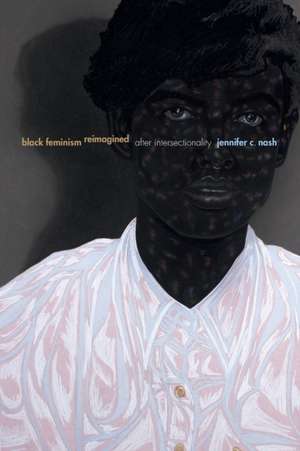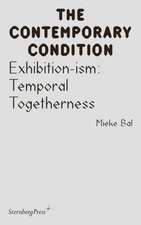Black Feminism Reimagined – After Intersectionality: Next Wave: New Directions in Women's Studies
Autor Jennifer C. Nashen Limba Engleză Paperback – 7 feb 2019
Din seria Next Wave: New Directions in Women's Studies
-
 Preț: 174.02 lei
Preț: 174.02 lei -
 Preț: 251.88 lei
Preț: 251.88 lei -
 Preț: 218.88 lei
Preț: 218.88 lei -
 Preț: 166.70 lei
Preț: 166.70 lei -
 Preț: 209.73 lei
Preț: 209.73 lei -
 Preț: 302.19 lei
Preț: 302.19 lei -
 Preț: 260.41 lei
Preț: 260.41 lei -
 Preț: 300.24 lei
Preț: 300.24 lei -
 Preț: 212.10 lei
Preț: 212.10 lei -
 Preț: 265.79 lei
Preț: 265.79 lei -
 Preț: 237.47 lei
Preț: 237.47 lei -
 Preț: 202.80 lei
Preț: 202.80 lei -
 Preț: 301.20 lei
Preț: 301.20 lei -
 Preț: 306.00 lei
Preț: 306.00 lei -
 Preț: 251.12 lei
Preț: 251.12 lei -
 Preț: 262.70 lei
Preț: 262.70 lei -
 Preț: 204.87 lei
Preț: 204.87 lei -
 Preț: 309.49 lei
Preț: 309.49 lei -
 Preț: 263.29 lei
Preț: 263.29 lei -
 Preț: 261.38 lei
Preț: 261.38 lei -
 Preț: 262.52 lei
Preț: 262.52 lei -
 Preț: 301.20 lei
Preț: 301.20 lei -
 Preț: 266.18 lei
Preț: 266.18 lei -
 Preț: 263.29 lei
Preț: 263.29 lei -
 Preț: 262.32 lei
Preț: 262.32 lei -
 Preț: 263.09 lei
Preț: 263.09 lei -
 Preț: 262.32 lei
Preț: 262.32 lei -
 Preț: 259.42 lei
Preț: 259.42 lei -
 Preț: 219.70 lei
Preț: 219.70 lei -
 Preț: 301.38 lei
Preț: 301.38 lei -
 Preț: 260.19 lei
Preț: 260.19 lei -
 Preț: 196.55 lei
Preț: 196.55 lei -
 Preț: 261.38 lei
Preț: 261.38 lei -
 Preț: 304.10 lei
Preț: 304.10 lei -
 Preț: 205.09 lei
Preț: 205.09 lei -
 Preț: 211.33 lei
Preț: 211.33 lei - 19%
 Preț: 636.69 lei
Preț: 636.69 lei
Preț: 158.45 lei
Nou
Puncte Express: 238
Preț estimativ în valută:
30.32€ • 32.93$ • 25.47£
30.32€ • 32.93$ • 25.47£
Carte disponibilă
Livrare economică 01-15 aprilie
Livrare express 15-21 martie pentru 21.19 lei
Preluare comenzi: 021 569.72.76
Specificații
ISBN-13: 9781478000594
ISBN-10: 1478000597
Pagini: 184
Dimensiuni: 152 x 229 x 10 mm
Greutate: 0.27 kg
Editura: MD – Duke University Press
Seria Next Wave: New Directions in Women's Studies
ISBN-10: 1478000597
Pagini: 184
Dimensiuni: 152 x 229 x 10 mm
Greutate: 0.27 kg
Editura: MD – Duke University Press
Seria Next Wave: New Directions in Women's Studies
Cuprins
Acknowledgments vii
Introduction: Feeling Black Feminism 1
1. A Love Letter from a Critic, or Notes on the Intersectionality Wars 33
2. The Politics of Reading 59
3. Surrender 81
4. Love in the Time of Death 111
Coda: Some of Us are Tired 133
Notes 139
Bibliography 157
Index 165
Introduction: Feeling Black Feminism 1
1. A Love Letter from a Critic, or Notes on the Intersectionality Wars 33
2. The Politics of Reading 59
3. Surrender 81
4. Love in the Time of Death 111
Coda: Some of Us are Tired 133
Notes 139
Bibliography 157
Index 165
Notă biografică
Descriere
Jennifer C. Nash reframes black feminism's engagement with intersectionality, contending that black feminists should let go of their possession and policing of the concept in order to better unleash black feminist theory's visionary and world-making possibilities.





